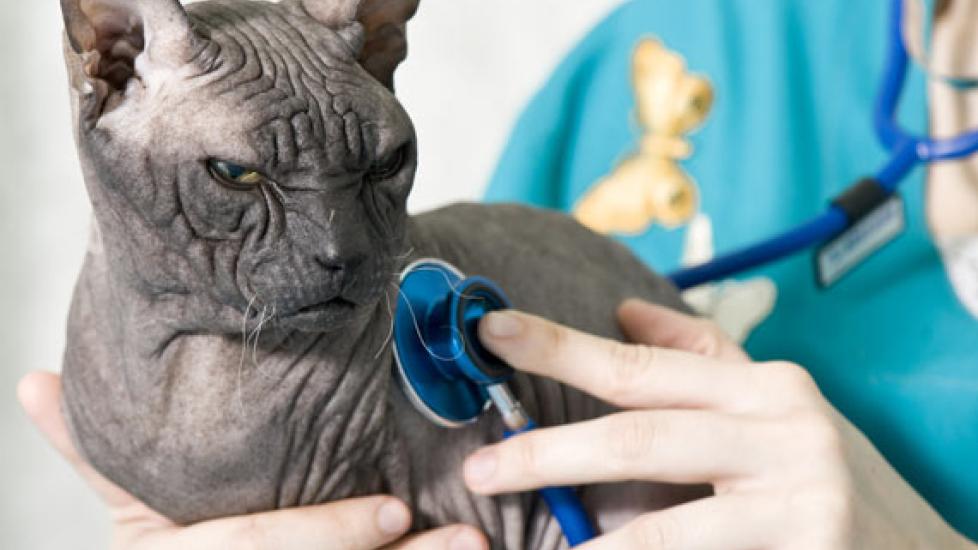5 Common Cat Illnesses that are Impacted by Nutrition
A high quality, well-balanced diet is fundamental to your cat's health, but do you know why? Here are just a few illnesses commonly seen in cats that are directly affected by their diet.
1. Obesity
Obesity is a nationwide epidemic for our pets, affecting over 50% of American cats1. Even worse, cats affected by obesity are more prone to arthritis, diabetes, high blood pressure, and cancer.
Pay special attention to the calorie and fat levels of your cat's food. While they are both important to the diet, an overabundance of either can cause or exacerbate obesity in cats. Likewise, finding a specially formulated diet that limits calories and fats can help trim down an overweight or obese cat.
Determine your pet's ideal weight by consulting your veterinarian or by using petMD's Healthy Weight Calculator.
2. Pancreatitis
Pancreatitis develops when the pancreas becomes inflamed, causing the flow of digestive enzymes to be released into the abdominal area. If this occurs, the digestive enzymes will begin to break down fat and proteins in the other organs, as well as in the pancreas.
"In cats, dietary fat is known to be associated with the development of pancreatitis and can stimulate the secretion of a hormone that induces the pancreas to secrete its digestive hormones," says Jennifer Coates, DVM. Consult your veterinarian to see if your cat's current dietary fat intake may be increasing his or her risk of pancreatitis. If your cat is already suffering from pancreatitis, Dr. Coates recommends dog foods that are bland, low in fat, and easily digestible.
3. Feline Lower Urinary Tract Disease (FLUTD)
Feline lower urinary tract disease, or FLUTD, is a complex of diseases that cause similar symptoms, including inappropriate urination (urinating outside of the litter box), repeated attempts to urinate, difficulty urinating, painful urination, bloody urine, lack of appetite, and irritation. A number of risk factors are associated with FLUTD. Stress brought on by a new pet in the household, a new person in the household, a change in the daily routine (change in work schedule, etc.), or a change in the environment (moving to a new home, new furniture, moving furniture to new location within the home, renovations, etc.) can all bring about FLUTD. Other risk factors include low activity level, excess weight and diet.
Encouraging increased water consumption and/or adding more canned food to the diet to increase moisture intake can have a protective effect. Speak to your veterinarian about the best ways to prevent FLUTD in your cat.
4. Heart Disease
Cats often have issues with heart disease like we do, especially if their diet isn't properly balanced. One key factor to heart disease in cats is their sodium (salt) intake. "Increased sodium in the diet causes increased levels of sodium circulating in the blood," says Ken Tudor, DVM. "These elevated levels of sodium cause water retention in the blood vessels and elevated blood pressure. As blood pressure increases the diseased heart must continue to enlarge to overcome the increased pressure in order to pump blood from the ventricles."
Are you feeding your cat table scraps? Is your cat's current food too high in sodium? Talk to your veterinarian about these things and how your cat may benefit from a diet that is lower in sodium.
5. Diarrhea
Cats suffering from bouts of diarrhea isn't unusual, but did you know there are two main types of diarrhea: small bowel and large bowel diarrhea. "Cats with small bowel diarrhea typically produce large amounts of soft stool but do so just a few times a day," says Dr. Coates. "When abnormalities are centered in the colon, affected cats will usually strain to produce small amounts of watery stool frequently throughout the day. This is large bowel diarrhea."
"For large bowel diarrhea," says Dr. Coates "a high fiber diet has been shown to be beneficial. Ideally, both soluble fiber (the type colonic bacteria use for food) and insoluble (indigestible) fiber should be included." For small bowel diarrhea, Dr. Coates recommends a bland, low fat, easily digested diet.
Discuss with your veterinarian how fat, fiber, calcium, phosphorus, and other dietary nutrients play an important role in your dog's health. He or she may even have important new dietary recommendations to consider for your dog's specific life stage and lifestyle.
